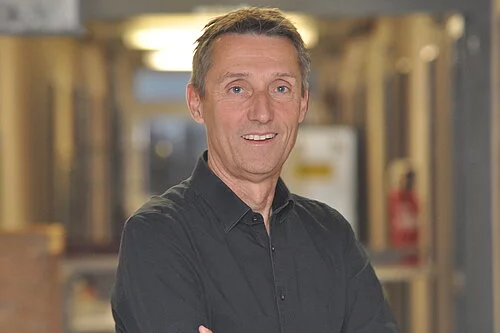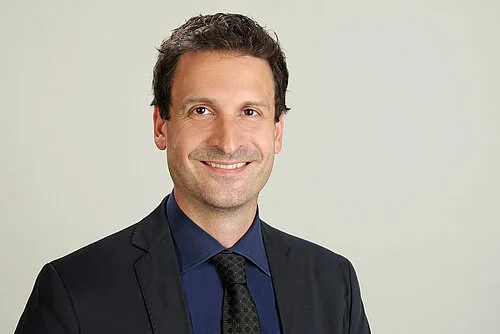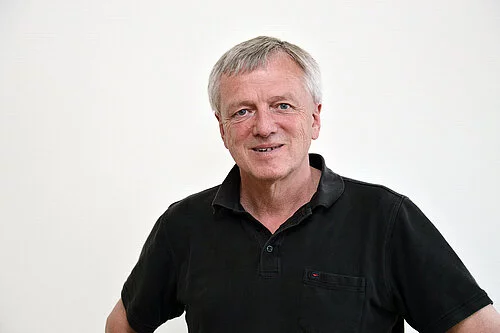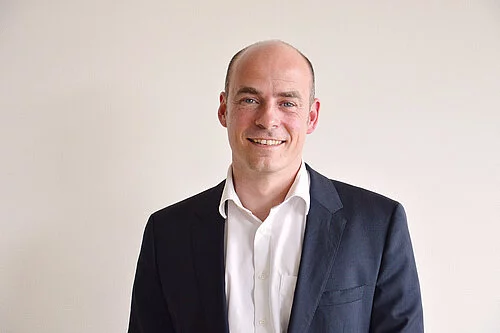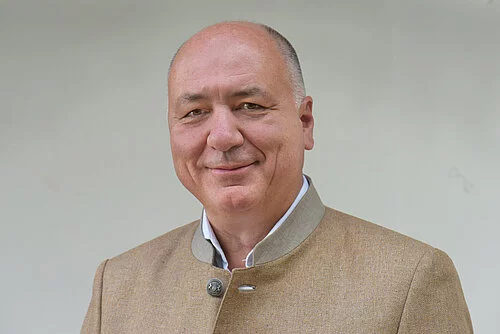Five PMI cluster members are "Highly Cited Researchers" 2023
Five members of the Cluster of Excellence "Precision Medicine in Chronic Inflammation" are among the most frequently cited researchers worldwide in 2023.
Axel Hauschild – Therapeutic advances in malignant melanoma
Since his time as a junior doctor in the Department of Dermatology, Venereology and Allergology at the UKSH, Kiel Campus, more than 30 years ago, Professor Axel Hauschild has been interested in skin cancer, especially malignant melanoma, a highly malignant tumor. The introduction of new drugs has significantly improved the treatment of advanced disease in recent years. "The 5-year survival rate, which is used as a measure of cure, was 5% for advanced melanoma in 2010 and is now 52%. But there are now also effective therapies for light skin cancer - even for non-operable patients with very large and metastatic tumors," emphasizes Hauschild, who has played a major role in this success. Hauschild has led more than 120 clinical trials on various skin cancers, has been invited to more than 700 conferences around the world and has published 440 articles in high-ranking scientific journals. Since 2019, he has been on the list of "highly cited researchers" for the fifth time in a row.
In recognition of his clinical and scientific achievements in skin cancer therapy, Hauschild was awarded the German Skin Cancer Prize in 2003 and the German Cancer Prize of the German Cancer Society in 2011. He is a long-standing board member of the European Association of Dermato-Oncology (EADO), was President of the German Skin Cancer Society (ADO) for 8 years and twice President of the German Skin Cancer Congress and the Melanoma World Congress, where he was elected President of the Melanoma World Society (MWS) in 2021. The MWS is the successor organization to an expert group of the World Health Organization (WHO). Its aim is to coordinate research activities and improve the care of people suffering from skin cancer worldwide.

"Highly Cited Researcher" in the "Clinical Medicine" category: Prof. Dr. Axel Hauschild is a senior physician and head of the "Dermatological Oncology" working group at the Clinic for Dermatology, Venereology and Allergology at the UKSH, Kiel Campus, as well as a member of the PMI Cluster of Excellence.
Frank Leypoldt – Diagnosis and therapy of encephalitis
PD Dr. Frank Leypoldt's research focuses on inflammation of the brain (encephalitis). Antibody-mediated autoimmune encephalitis in particular has been discovered in the last 20 years as a frequently unrecognized but treatable disease. It can occur spontaneously without a recognizable trigger, but also as a result of unrecognized tumor diseases or following viral inflammation of the brain. The neurologist and laboratory physician has been researching these rare but threatening diseases from various angles for more than 15 years. His work has contributed significantly to the development of animal models, the identification of viral triggers and the improvement of diagnostics and therapy. Leypoldt was involved in the development of diagnostic criteria and has done much to promote networking between researchers and hospitals in Germany on this topic. "Ultimately, relevant progress in research into rare diseases is only possible in teams and networks. Without the personal interest and commitment of many colleagues and the willingness of those affected to participate in data collection and research, progress in this field would hardly be possible," emphasized Leypoldt, who heads the Neuroimmunology working group at the Institute of Clinical Chemistry at the UKSH, Kiel Campus.
Leypoldt is chairman and organizer of the German Network for Research on Autoimmune Encephalitis (GENERATE e.V.). He has given over 180 national and international teaching and training lectures, published more than 150 scientific papers, is a member of various professional societies and a member of the editorial board of the renowned neuroimmunology journal Neurology N2. He is involved in the development of national and international guidelines and advises the WHO.

"Highly Cited Researcher" in the "Cross Field" category: PD Dr. Frank Leypoldt, member of the PMI Cluster of Excellence, is a senior physician at the Institute of Clinical Chemistry and the Department of Neurology at the UKSH, Kiel Campus, as well as a member of the Cluster of Excellence PMI.
Stefan Rose-John – Regulation of inflammatory processes
Professor Stefan Rose-John is an internationally sought-after expert on the cytokine interleukin-6 (IL-6). He was Professor of Biochemistry at the Faculty of Medicine at Kiel University and Director of the Institute of Biochemistry for more than 22 years. He has been retired since October 2022. The biochemist recognized the central importance of the messenger substance IL-6 in inflammation more than 25 years ago and systematically researched its structure and mode of action. In 2001, he published the spatial structure with which IL-6 binds to one of its receptors in the renowned scientific journal Science, thereby laying the foundation for further research. He was also the first to describe the proteolytic formation of a soluble IL-6 receptor and the resulting IL-6 trans-signaling pathway. He demonstrated that this pathway is crucial for triggering chronic inflammation, while the classical signaling pathway regulates processes of cell renewal and the normal protective immune response. This discovery makes it possible to specifically inhibit only the pro-inflammatory signals of interleukin-6. Rose-John developed the designer protein sgp130Fc, which specifically blocks the interleukin-6 trans-signaling pathway and thus inhibits inflammation. Under the name Olamkicept, a further development of the protein has already been tested in clinical trials on people with chronic inflammatory bowel disease with extremely positive results.
Rose-John has been a member of the DFG Cluster of Excellence for Inflammation Research since its inception and founded the Collaborative Research Center 877 "Proteolysis as a Regulatory Element of Pathophysiology" at Kiel University in 2010, which he has headed ever since. He is an elected member of the Hamburg Academy of Sciences and Humanities and was awarded the Science Prize of the City of Kiel in 2005 and the Jacob Henle Medal of the University of Göttingen in 2019.
![[Translate to English:] Porträtfoto](/fileadmin/_processed_/2/b/csm_stefan-rose-john_b8d3ae2bad.jpg.webp)
"Highly Cited Researcher" in the "Cross Field" category: Prof. Dr. Stefan Rose, John, member of the Cluster of Excellence PMI, was Director of the Institute of Biochemistry at Kiel University until October 2022 and continues to head the Collaborative Research Center 877 "Proteolysis as a regulatory event in pathophysiology".
Philip Rosenstiel – Molecular signatures of chronic inflammation
Professor Philip Rosenstiel's research aims to contribute to a better understanding of the development of chronic inflammatory diseases. In particular, he is investigating the complex interactions between the human intestinal mucosa and the environment and how these interactions change in health and disease. "In the chronic inflammatory bowel diseases Crohn's disease and ulcerative colitis, normal immune responses are permanently disrupted, which then turn against the body. We are trying to understand and change the misprogramming of the cells, i.e. the molecular switches of inflammation. The aim is to translate this knowledge into more precise therapies," explains the Director of the Institute of Clinical Molecular Biology at the Kiel University and UKSH and Vice Dean of the Faculty of Medicine at the Kiel University. In order to answer research questions on the molecular causes of chronic inflammatory diseases and to develop innovative biomarkers, Rosenstiel's working group uses novel tools and techniques of modern high-throughput sequencing, such as single-cell analysis.
Philip Rosenstiel is spokesperson of the Center of Competence for Genome Analysis (CCGA), steering committee member of the Cluster of Excellence "Precision Medicine in Chronic Inflammation" (PMI) and member of several large sequencing consortia that describe the genomic and epigenomic architecture of human inflammatory diseases. His scientific work comprises more than 450 publications.

"Highly Cited Researcher" in the "Cross Field" category: Prof. Dr. Philip Rosenstiel, steering committee member of the Cluster of Excellence "Precision Medicine in Chronic Inflammation" (PMI) and Director at the Institute of Clinical Molecular Biology, Kiel University and UKSH.
Stefan Schreiber – Innovative approaches for chronic inflammatory diseases
The mechanisms of inflammation and the development of new therapies for chronic inflammatory diseases have been the focus of Professor Stefan Schreiber's research for many years. On the basis of new molecular findings, he is looking for innovative approaches to the prevention and treatment of these diseases. On Schreiber's initiative, the Inflammation at Interfaces network was formed in 2004, which was funded by the Excellence Initiative of the German federal and state governments from 2007 to 2018 and has been continued as the Cluster of Excellence Precision Medicine in Chronic Inflammation (PMI) since 2019. In 2020, Schreiber received the prestigious research award from the umbrella organization of European gastroenterology societies, the UEGF, to develop a new therapy for people with chronic inflammatory bowel disease based on molecular nutritional intervention. He developed the idea of an interdisciplinary inflammation clinic with the aim of treating inflammation in a holistic rather than organ-fixated manner. Since 2009, patients have been treated according to this concept at the Center of Excellence for Inflammation Medicine at the UKSH, Campus Kiel. "We are developing new therapies to achieve better therapeutic success in chronic diseases. To do this, we have to conduct intensive research in order to improve," emphasizes Schreiber.
Stefan Schreiber is Director of the Institute of Clinical Molecular Biology at the Kiel University and UKSH and Director of the Department of Internal Medicine I at the UKSH, Kiel Campus. He has been on the list of "highly cited researchers" for the seventh time in a row since 2017. As principal investigator, he has supervised more than 80 clinical trials in the field of chronic inflammatory bowel disease Crohn's disease and ulcerative colitis, including more than 50 as lead investigator. He is a member of various specialist societies, has chaired numerous national and international conferences, is co-editor of international specialist journals and author or co-author of more than 950 publications in scientific journals.

"Highly Cited Researcher" in the category "Clinical Medicine": Prof. Dr. Dr. hc. Stefan Schreiber is spokesperson of the Cluster of Excellence "Precision Medicine in Chronic Inflammation" (PMI), Director of the Institute for Clinical Molecular Biology, Kiel University and UKSH, and Director of the Department of Internal Medicine I at the UKSH, Kiel Campus.
About the Cluster of Excellence PMI
The Cluster of Excellence "Precision Medicine in Chronic Inflammation" (PMI) is being funded from 2019 to 2025 through the German Excellence Strategy (ExStra). It succeeds the "Inflammation at Interfaces” Cluster, which was already funded in two periods of the Excellence Initiative (2007-2018). Around 300 members from eight institutions at four locations are involved: Kiel (Kiel University, University Medical Center Schleswig-Holstein (UKSH), Muthesius University of Fine Arts and Design, Kiel Institute for the World Economy (IfW), Leibniz Institute for Science and Mathematics Education (IPN)), Lübeck (University of Lübeck, University Medical Center Schleswig-Holstein (UKSH)), Plön (Max Planck Institute for Evolutionary Biology) and Borstel (Research Center Borstel - Leibniz Lung Center).
The goal is to translate interdisciplinary research findings on chronic inflammatory diseases of barrier organs to healthcare more intensively, as well as to fulfil previously unsatisfied needs of the patients. Three points are important in the context of successful treatment, and are therefore at the heart of PMI research: the early detection of chronic inflammatory diseases, the prediction of disease progression and complications, and the prediction of individual responses to treatment.
Press office
fbuhse@uv.uni-kiel.de+49 (0)431/880 4682 https://precisionmedicine.de
Cluster of Excellence "Precision Medicine in Chronic Inflammation"
Scientific Office
Head: Dr. habil. Susanne Holstein Postal
Christian-Albrechts-Platz 4, 24118 Kiel, Germany
Contact: Sonja Petermann
+49 (0)431 880-4850, fax: +49 (0)431 880-4894
spetermann@uv.uni-kiel.de
Twitter: PMI @medinflame


